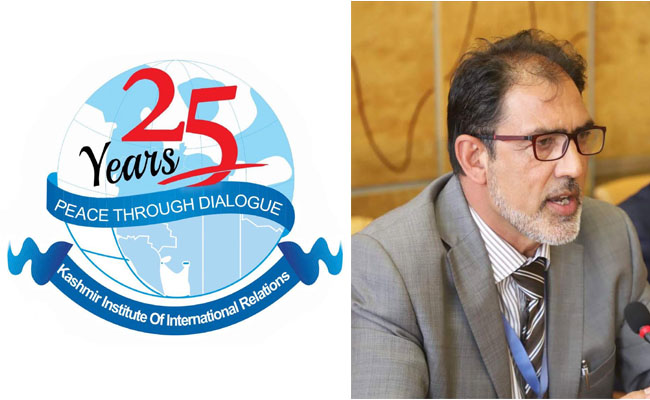Slams India’s massive crackdown on journalists
Islamabad: Veteran human rights activist and Chairman Kashmir Institute of International Relations (KIIR) Altaf Hussain Wani has sought United Nation’s urgent intervention to end continued persecution of Kashmiri journalists at the hands of Indian occupation authorities.
In a letter addressed to the United Nations Special Rapporteur on the promotion and protection of the right to freedom of opinion and expression the KIIR chief said that muzzling media and silencing well reputed journalists has become a new norm in Kashmir. Referring to recent incidents of harassment and intimidation of journalists in the restive region, Wani pointed out that dozens of journalists working with well reputed regional and international media outlets have been charged under the infamous Unlawful Activities (Prevention) Act (UAPA). Underling the dangerous aspects of the UAPA he said, “It is a dangerous piece of legislation by the Indian parliament, which empowers the government to practically declare anyone as a terrorist”. He said that this act gives a free license to the government to label dissidents as terrorists and sent them to jail for a period of two to ten years.
“It was quite unfortunate that journalists are being summoned to police stations and forced to reveal their sources and explain their stories”, Wani said. Citing the FIR filed against Kashmiri journalists he said Masrat Zuhra, Gowhar Geelani, Peerzad Ashiq are amongst dozens of noted journalists who have been charged under the infamous UAPA act recently. Earlier, he mentioned that, Indian authorities arrested a budding journalist Asif Sultan under UAPA in August 2018 whereas Qazi Shibli was being held without charge or trial under PSA. Another journalist Kamran Yusuf, he said, was also charged under the UAPA. He said that there was long list of similar incidents wherein prominent journalists were summoned at police stations. He lamented that Kashmir has been turned into lawless state where anything can happen with any one at any time.
Slamming India’s massive crackdown on journalists, he said, “There has been tremendous pressure on journalists, they are being frequently summoned by police, and they are being thrashed, humiliated and harassed by the authorities without any reason”. And all this he said has been joining on unabated. “The media men who are supposed to report what is actually happening on ground are prevented to perform their duty freely”, he said adding that this is not only illegal but an atrocious assault on the right to freedom of opinion and expression enshrined in a number of international and regional human rights instruments, such as universal declaration of human rights, International Covenant on Civil and Political Rights (ICCPR), International Covenant on Economic, Social and Cultural Rights (ICESCR) and other laws.
Referring to the Article 19 of the Universal Declaration of Human Rights he said, “Everyone has the right to freedom of opinion and expression; this right includes freedom to hold opinions without interference and to seek, receive and impart information and ideas through any media and regardless of frontiers”.
Highlighting the plight of Kashmiri journalist community he said, journalists, as well as publishers in the occupied Kashmir have been in the eye of storm for too long. Many journalists he said have been killed in Kashmir since 1990 while performing their duties. “But those involved in this heinous crime of murdering journalists, writers and bloggers, have never been held accountable”, he regrettably noted .
Praising women journalists for their valour to work to highlight the pain and miseries of people living in the conflict zone, he said, “Asiya Jeelani, a human rights activist & journalist who edited Voices Unheard, a magazine on women & the Kashmiri struggle was first Kashmiri working journalist who was killed in an IED attack on April 20th, 2004 at the age of 30 while monitoring elections in Kupwara”. He said that India state has been using these imperialistic tools as a weapon of war to gag media and choke every truthful voice in Kashmir.
Terming these actions in direct contravention of international standards of freedom of opinion, expression, and free press Wani appealed the United Nations to take effective notice of the occupation authorities’ attempt to curb the right to freedom of expression. Calling for an immediate end to harassment and intimidation of journalists through draconian laws such as UAPA the KIIR chief said that the government of India should be held accountable for the crimes it has committed against Kashmiris.
